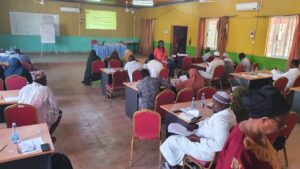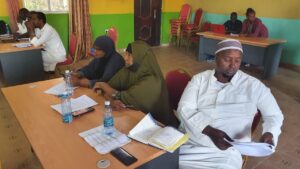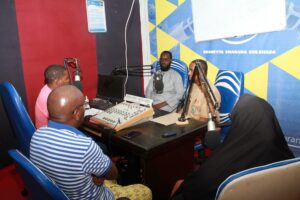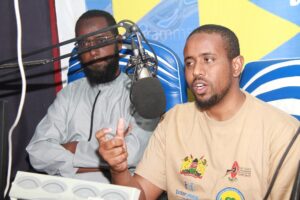Côte d'Ivoire is not spared from external threats and the dynamics of regional and global conflict. These further destabilise the already fragile social fabric and endanger the government's achievements in security and economic development.
Over the last few decades, Côte d'Ivoire has itself been marked by socio-political crises and regular cycles of violence that have profoundly affected the lives of Ivorians, the way they live together and social cohesion.
Threats linked to armed groups at the country's doorstep call for the strengthening of the internal social fabric to prevent any risk of tipping over. It is usual for these groups to exploit the cracks and fissures caused by various factors to act.
In order to contribute to the efforts of Ivorian society, Interpeace, which has been present in the country since 2012, signed a partnership agreement with the Minister of Reconciliation and Social Cohesion on 21 October. This agreement aims to strengthen the consolidation of peace, reconciliation and national cohesion in the coastal country.
Both partners commit to work together in seeking and funding responsible and beneficial collaboration opportunities to achieve these objectives. Committed to close cooperation, the Ministry will provide political leadership, guidance and coordination of Interpeace projects, including the current Project to prevent political violence and strengthen social cohesion through dialogue and citizen collaboration in Côte d'Ivoire (PREDIA).
For its part, Interpeace will provide technical and methodological support to inclusive dialogue in all regions of the country, capitalising on lessons learned from conflict prevention mechanisms set up in cooperation with its local partner, Indigo Côte d'Ivoire, and targeting in particular women and youth. The organisation will also support local prevention and reconciliation committees and actively participate in the elaboration of strategies at the technical and political level adapted to Ivorian peacebuilding priorities, with a view to building sustainable peace and contributing to the strengthening of social cohesion.
"We are very pleased to engage in this partnership with the Ministry of Reconciliation and Social Cohesion," says Interpeace's West Africa programme representative Alessia Polidoro. "The methodological rigour of our approach, the diversified experience of successful interventions in different contexts around the world and the expertise of our team and our local partner, Indigo Côte d'Ivoire, will be pooled with the Ministry to provide concrete, endogenous and sustainable solutions to the various challenges to be addressed.
Read more about Interpeace in Côte d'Ivoire here.
Imagine a community that collaborates closely with the police to ensure public security and efficient policing. Now imagine this happening in a society where violent conflicts are common. This is a type of trust building approach between communities and the police currently happening in Ethiopia. The police and the general public collaborate to identify community problems and then devise and implement solutions to those issues. The resolution approach considers home-grown knowledge of the area and the cultural, social, and psychological conditions of the society. Creating a strong relationship based on trust between the police and society is the basis for providing security to people and guaranteeing an effective policing service. This approach in Ethiopia is helping to break away from a reactive style of policing towards a more trusting, proactive and preventive approach.
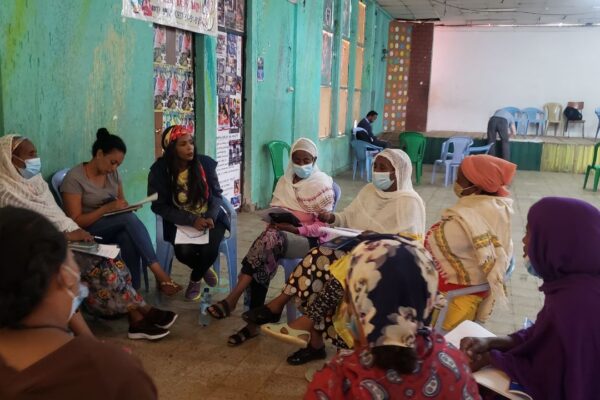
Ethiopia is a paradoxical country in flux. Since Abiy Ahmed's ascent to power in 2018, Ethiopia has been on a path of significant social, economic, and political transformation. Simultaneously, the country has experienced a devastating civil war that displaced millions, cost countless lives, and caused a significant rift in Ethiopia's federal structure and ethnic fabric.
While the ongoing conflicts in Ethiopia and alleged war crimes have damaged national and international reputations around its reform agenda, there are numerous ongoing government and non-government initiatives to improve community and state relations, address community needs, and reform institutions to deepen democracy, broaden citizen participation, and promote peace. For instance, around the end of 2020, Ethiopia's Ministry of Peace presented a progressive new policing doctrine, pledging the federal and regional police to submit to stronger public oversight, improve respect for diversity and uphold international human rights standards. Interpeace, in partnership with the Ethiopia Police University, is working on a trust building program between citizens and the police to provide a method to make the progressive philosophy captured in the Ethiopia Police Doctrine a reality of on the ground.
In 2021, Ethiopia's Ministry of Peace and Interpeace conducted a baseline review and surveyed a total of 1,786 people from four Woredas (District-level administrative units) to assess the difficulties encountered in interactions between the community and the police. The review revealed that trust has long been the missing link in the police service across the Woredas surveyed. Notably, the youth were skeptical of the police, and there was a lack of consistency in local community police support for public safety programs in neighbourhoods. Little was said about the support provided to women and people with disabilities, leading to the conclusion that the existing platforms to ensure active public engagement were superficial, as community residents had little influence over identifying, prioritizing, and resolving pressing community issues.
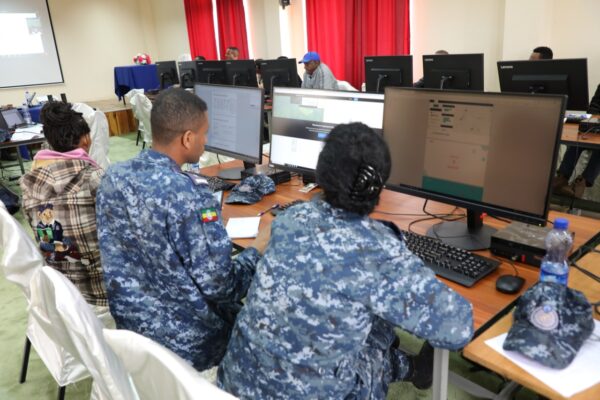
To address these issues, this community policing program emphasizes the importance of police and public collaboration in identifying and prioritizing community safety concerns. The police and the community get to choose the highest priority concerns and work together to better understand safety issues. To that end, Geographic Information System (GIS) software is used to electronically map out the locations of community safety events discovered in the Woredas. The software has paved the way for police and the public to visualize and comprehend problems in novel ways. It promotes discussion about the facts displayed on the GIS screen rather than individual perceptions of the issues. For example, people in a Woreda may complain to the police about a rise in street crime, such as muggings. The police input the data from the street crime incident into the GIS mapping programme. They share the maps produced by the GIS programme with the community and together analyze the data to better understand what is causing the increase in incidents and devise a response to prevent the crimes from occurring again. The software can only be used for preventive policing together with communities and not to support any criminal investigations that could compromise the trust in the police.
Matters that are important to the public are not always important to the police, and vice versa. The community GIS allows everyone involved to gain a common understanding, promotes trust and open dialogue, and leads to the implementation of longer-term problem-solving actions.
One of the primary goals of this joint approach between police and citizens is the reduction of insecurity and improvement of safety in a community. Citizens, on the other hand, will only be willing to work with the police if they see an improvement in public safety and security and have trust in the police and other law enforcement agencies. It is worth noting that this police-community trust-building initiative has achieved remarkable results by having community members collaborate with Woreda-level community policing officers to identify and prioritize community safety issue. Ultimately, this project is providing Ethiopian police services with a method that can be instrumental in transforming the Ethiopian Police Doctrine from a philosophy into a reality on the ground. This can have far reaching consequences in terms of improving community safety across the country and establishing strong foundations of trust between Ethiopian citizens and police services.
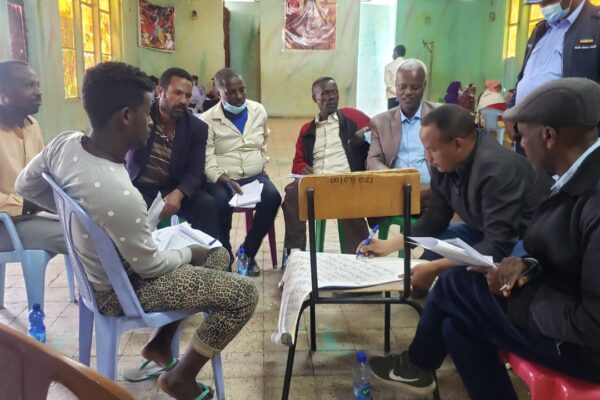
While the August 2022 elections in Kenya passed without significant disruption, addressing inter-community tensions after the campaigns and resolving long-standing concerns in areas identified as hot spots requires continuous support and community mediation.
In the semi-arid and arid regions of northern and eastern Kenya, intercommunal tensions and disputes over scarce resources are common, especially during and immediately following election periods. Political and economic marginalisation, exclusion, and inequality are pervasive problems in the Northeast and have a disproportionately negative impact on the region. Because of the complicated interplay between intercommunal tensions, anxiety about electoral competition, and post-election resource allocation, ongoing mediation is required to promote political reconciliation, address intercommunal tension that arose during political campaigns and grievances over long-standing issues in conflict hot spots.
Supported by the United Nations Resident Coordination Office (RCO), Interpeace and the Frontier Counties Development Council (FCDC) Peace Sector Forum, whose Independent Panel of Eminent Persons (IPEP) includes members of the National Peace and Mediation Team; UWIANO, the Women Mediation Network, the National Cohesion and Integration Commission (NCIC) collaborated to organise a two-day workshop mediator training. More than 100 mediators from Lamu, Wajir, and Isiolo, three counties identified as conflict hot spots before, during, and after elections, participated in the training. The mediators will oversee the practical aspects of community engagement in close collaboration with FCDC members in the target counties.
Mediating conflicts is becoming increasingly common. This is due to the fact that agreements can be reached on a wide range of dispute resolutions that previously would have been unresolvable.
Although the mediators are respected members of their communities, several are unfamiliar with mediation principles and have limited capacity to facilitate community-level dialogue processes that adhere to international standards. The training sessions will impart skills on deepening understanding of mediation, its processes, and universal ; strengthening mediators' capacity for conflict analysis; political economy analysis; and stakeholder mapping for effective intervention in hotspot counties; increasing knowledge and awareness of gender sensitivity and inclusion in mediation processes (e.g., gender, UNSCR 1325, Leave No One Behind); and discussing the key elements of community dialogue to a community-level audience.
Interpeace has found community mediation to be an effective tool for sustaining peace through locally led peace infrastructure. That approach has been successful in the villages along the North Rift's Kapedo-Lokori corridor, which had become notorious for violent conflict and loss of life and property. Even though the assumptions and values that guide the process vary a lot from place to place, mediation has been used successfully to promote peace in many different cultural settings.

"Peace is such a fragile product that you can spend years nurturing it, only for it to be brought down overnight like a building demolished by excavators. You can only wake up to the debris. If there is a time when such a thing is susceptible to occur, it's during the general elections held every five years in our country." Mohamed Harun, County Chief Officer, Youth Affairs, County Government of Mandera.
In the past, there has been a lot of violence during elections, which has caused the loss of lives, displaced many Kenyans, destroyed property, and led to loss of livelihoods. “Communities turn their backs on each other; voters are transported in mass from one place to a different place to vote for 'their person'; the elderly are dethroned and dehorned, and all the functioning structures of the communities are suspended. Unfortunately, this often leads to evil people in our midst taking advantage of such a situation by starting conflicts,” observes Harun.
These polling-related incidents are oftentimes an expression of existing and overlapping conflicts, which are frequently influenced by past skirmishes whose wounds haven't healed. In turn, the drivers of these various conflicts are linked to Kenya's deep and persistent fault lines, themselves related to historical, socio-political marginalization and grievances and elite manipulation of identities for political mobilization. However, the collaborative efforts by various peacebuilding actors have played a key role in mitigating skirmishes to address the drivers of violent conflict and strengthen social resilience for peace.
On the 9th of August 2022, Kenyans went to the polls and voted in a largely peaceful manner. On the 15th of August 2022, William Samoei Ruto, Chief of the Order of the Golden Heart (C.G.H.), was announced as president elect. However no larger-scale electoral violence occurred, despite the hotly contested poll, high tensions at the tallying center and the subsequent legal challenge by veteran politician Raila Odinga and his Azimio La Umoja coalition. There were isolated incidents. Voting was suspended in the Eldas constituency of Wajir County due to security concerns following a gunfire incident that halted the transportation of ballot materials. Political differences in counties like Lodwar Town and West Pokot were associated with fighting and public confrontation as the North Rift region has experienced tensions and violence during past elections.
The largely peaceful conclusion of the elections is a big success resulting from enormous efforts by Kenyan authorities, civil society, and international partners. Supported by the German Federal Foreign Office, Interpeace and its partners, the National Cohesion and Commission (NCIC) and the Network for Peace, Cohesion and Heritage (NEPCOH) Trust, supported in-country actors in their efforts to build peace and prevent violent conflicts through their Election Violence Prevention Project in several regions. Active in the counties of Mandera, Wajir, Turkana, West Pokot, Elgeyo Marakwet, Baringo, Samburu and Laikipia, the ongoing project focuses on the establishment of an early warning and rapid response mechanism and on peace sensitization for the public and electoral stakeholders.
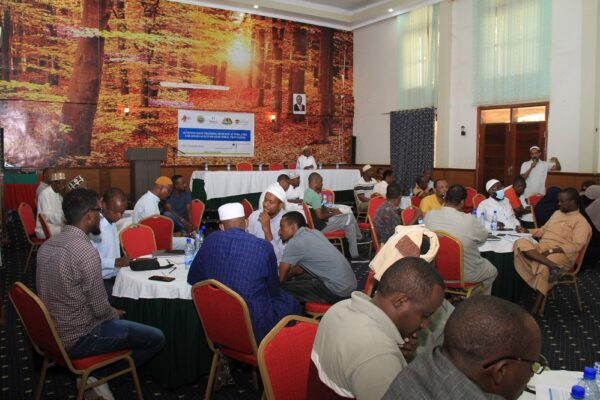
Early warning and rapid response to electioneering incidences
These structures were established across all the project’s counties and its members trained on electoral processes, mediation, and peacebuilding, enhancing their capacity to prevent, mitigate, and manage electoral violence. In total, 106 election and cohesion monitors were deployed to all sub-counties, continuously collecting information and passing it on to three situation rooms. Set up specifically for the electioneering period, these situation rooms processed all reports from the field and forwarded them to an integrated referral and response unit, consisting of government officials, security agencies, civil society leaders and members of local peace infrastructures, for follow-up actions.
Despite the overall peaceful nature of the elections, 21 incidents were picked up by the early warning and rapid response mechanisms. The project enabled rapid response to ten of those, while all others continue to be followed up on. For example, in the town of Konton on the border of Wajir and Mandera counties, a conflict between two Somali clans, the Garre and Degodia, broke out on August 6th, resulting in one death and five injured. Due to contested gubernatorial races in both counties and a history of inter-communal clashes between the two groups, fears were heightened that the upcoming elections would lead to an escalation of violence. However, the local peace infrastructures established in the previous phase were able to mediate the conflict with the support of the project. First, the communities agreed to table their differences until election-related tensions calmed down. The peace infrastructure then facilitated an agreement that entailed compensation payments and formal apologies, initiating a reconciliation process between the two groups.
Meetings were held to prepare the community for the elections and to train election monitors, who helped keep an eye in case of political violence. During the campaign period the county ceasefire monitoring committees (CMCs) were used to set up an early warning system for conflicts and a quick response system. The importance of the local peacebuilding infrastructures, in the elections and beyond, was emphasized by various stakeholders. Speaking during a training session, Chief Biashar, CMC Chairman highlighted the need to build on peace structures.
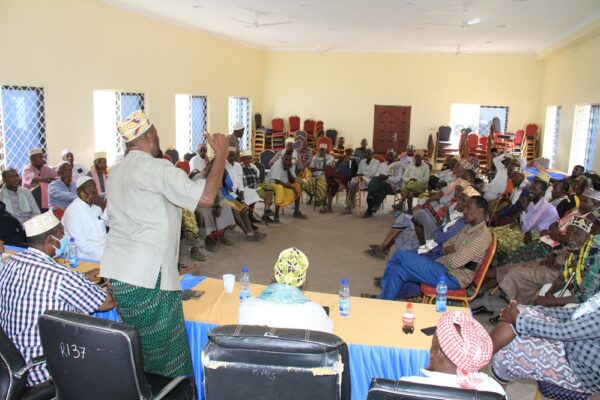
"We talk of addressing development in our communities, yet we overlook peace and its importance. What kind of development can we achieve without peace? I would suggest we focus all our energies and resources on building peace structures like CMCs and making them a fully functional peacebuilding body of their own, rather than investing resources in other unimportant development projects by our government. Peace should be prioritized above all. Once consensus is established, and its structures are in place, we can only discuss development.: said Chief , Ceasefire Monitoring Committees Chairman, Banisa
Training and advocacy for peaceful elections
In the run-up to the elections, NCIC, NEPCOH Trust and Interpeace planned and coordinated sensitization workshops, disseminated peace messages in local areas using branded materials, ran peace caravans, and advocated with political candidates to sign peace charters. All these efforts were geared towards garnering and sustaining commitment to peaceful elections by stakeholders across all levels of society.
In Mandera and Wajir counties, numerous stakeholders, who included local media houses and the youth, were trained on topics covering pro-peace messaging around the ‘Elections Bila Noma’ (“Elections without problems”) slogan, conflict-sensitive reporting, management of hate speech, and electoral alternative dispute resolution (EADR) mechanisms.
Following previous years where ‘boda boda’ (motorbike) operators instigated skirmishes in urban centers, a peace roadshow in Kapenguria and West Pokot under the ‘Elections Bila Noma’ theme was organized. Hussein Yussuf, the Mandera Chief Officer for the Department of Conflict Management, Cohesion, and Integration talked about the need for peace during the election period during a road show in Mandera.
"Peace is a very vital organ in our community. Like the heart organ in the body, peace is the kernel of our existence. Without it, all the other aspects of our lives are doomed! We must work extra hard during this electioneering period to make sure our communities will have peaceful elections and smooth transition of power to the new administrations," said Mr Hussein.
In prioritizing peace for all and in building structures to maintain stability, a particular focus on youth, women and marginalized groups is necessary for ensuring viability and sustainability. To effectively prevent, mitigate, and manage electoral violence and disputes, and decreasing the chance of escalation, women were therefore specifically targeted in various pieces of training and engagement. For example, they were often called to participate in numerous radio talk shows as key opinion leaders.
In addition, county prayer days, bringing together religious leaders and political candidates were facilitated. In a move to hold leaders accountable for their conduct during the general elections, political candidates, county commissioners, and the representatives of peace stakeholders signed peace charters across the . Chief Abey, a member of the CMC in Banisa reflected on the significance of collaborative peacebuilding efforts by stating, “Electioneering periods have always spelled doom for our people, especially along the Mandera North-Banisa corridor due to the memories of the past that the elections unearth. We have lost lives, properties, and livelihoods in elections due to the perennial clan conflicts between Garre and Degodia living along this corridor. Although this election is all about party politics and individual interest than clan affairs, we pray that we won’t have the repeat of what we had in the past. Our county and its people will blossom once we prioritize peace over everything.”
In Kenya, the focus of Interpeace’s work historically has been on peacebuilding at the community level in the north-eastern part of the country (Mandera and Wajir Counties) and, more recently, the North Rift Region. Its efforts to build peace are aimed at fostering equitable solutions to share power and resources; increasing and maintaining social cohesion among communities with long-standing and ongoing grievances; improving trust and cooperation between security actors and Kenya's public and helping to create new opportunities as ways to keep peace in Kenya after the elections.
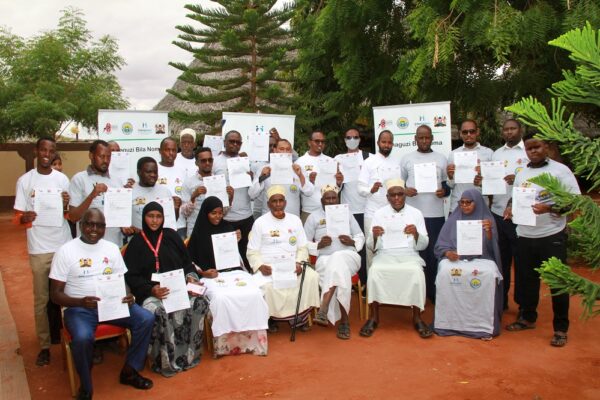
Mogadishu Somalia, 28 September 2022. The Ministry of Youth and Sports, Federal Government of Somalia and Interpeace, an international organization for peacebuilding based in Geneva, signed a Memorandum of Understanding (MoU) to partner in empowering Somali youth to be agents of transformative change and actively participate in the state-building process. The signing ceremony took place on Wednesday, 28 September, at the Ministry of Youth and Sports in Mogadishu. The MoU was signed by the Minister of Youth and Sports, H.E Mohamed Bare Mohamud, and Interpeace’s Somalia Country Representative, Ahmed Abdurrahman Abdullahi.
The collaboration will foster youth, peace and security resolutions through a mutual commitment to promote nationally-led peace processes to achieve sustainable peace, prevent violent conflict and enhance resilient capacities for peace in accordance to the partnership on UN Security Council Resolution 2250 on Youth, Peace and Security.
Speaking during the signing Ahmed Abdullahi, Somalia Country Representative, Interpeace said, “Interpeace is delighted to partner with the Ministry of Youth and Sports of Somalia. This partnership will foster youth-centered peacebuilding and harness the innovation and creativity of young women and men in the state-building process of Somalia.”
The partnership is anchored on fostering an institutional relationship of cooperation focused on sharing knowledge, expertise and experiences additionally collaborating in advancing youth representation and participation in the peacebuilding process across Somalia.
“This MoU solidifies our commitment to advancing youth leadership and participation in Somalia’s peacebuilding process and to strengthen resilient capacities for peace.” Said H.E Mohamed Bare Mohamud, the Minister of Youth and Sports. “We are pleased that Interpeace is a strategic partner in the youth, peace and security agenda in Somalia.”
A critical component of empowering young people is ensuring their right to participate in decision-making and economic development. The MoU will strengthen efforts to advance Somalia's youth, peace, and security agenda through joint policy development and programme implementation.
Interpeace
Interpeace is an international organization for peacebuilding. With over 25 years of experience, it has implemented a broad range of peacebuilding programmes in Africa, the Middle East, Asia, Europe, and Latin America. Interpeace tailors its approach to each society and ensures that its work is locally designed and driven. Interpeace also assists the international community – especially the United Nations – to play a more effective role in peacebuilding, based on Interpeace’s expertise in field-based work at the grassroots level. Interpeace is headquartered in Geneva, Switzerland, and has offices around the world. For more information, please visit our website: www.interpeace.org
Press Contact
Muthoni Ngure
+254751275530
Interpeace Eastern and Central Africa
5th Floor Priory Place,
Argwings Kodhek Road
The Bled Strategic Forum (BSF) and partners, having convened from 29-30 August 2022, urge the 2023 UN Water Conference co-hosts and organizers to reinforce the linkages between water and peace, and thereby enable a more habitable, peaceful planet for future generations.
Gathering five years after the launch of the 2017 Report of the Global High-Level Panel on Water and Peace, A Matter of Survival, we remain concerned that the Report’s powerful call for water to be recognized as a “fundamental condition of human survival and dignity”, and “the basis for the resilience of society and of the natural environment” – has gone largely unheeded. This presents a grave threat to the stability of societies and of our planet, which face increasingly precarious and unpredictable water-related events.
In recent decades, climate change, drought conditions, and governance failures have exacerbated challenges to water access and affordability, leading to an alarming rise in water-related conflicts. Today, none of the world’s conflict-affected nations are on track to meet the Sustainable Development Goals (SDGs), including on clean water and sanitation. At least 48 water-related conflicts rage globally[1], causing immense human suffering and further undermining social and economic progress for communities.
This year, the devastating droughts in southern Europe and parts of China, record-breaking heatwaves on the Indian subcontinent, and disastrous floods in Pakistan are simply the latest reminders of the fragility of our water systems and societies’ interdependence on them and on one other.
We therefore call upon the Kingdom of the Netherlands, Republic of Tajikistan, and the United Nations as co-hosts of the UN Water Conference in particular to:
- Acknowledge the interconnections and inter-dependencies of the global water system, and the fact that actions in one place will have consequences in another;
- Acknowledge the potential of water cooperation as a catalyst for peace, and of peacebuilding actions in advancing SDG 6 on access to safe, clean water;
- Reflect the convergence of water and peace as a thematic priority at the 2023 UN Water Conference;
- Involve stakeholders in interdisciplinary discussions about the interlinkages between peace and water in the lead up to the Conference.
One unquestionable truth from the 2017 report prevails - there is no substitute for water. New forms of governance, partnership, and decision-making are required to adapt and respond to these threats and changing realities. Just as inclusive and participatory water resource management can yield peace dividends, diplomatic efforts to broker peace can enhance access to safe and clean water in conflict-affected societies. With global freshwater supplies acutely under threat, we can no longer afford to tackle issues of water and of peace in siloes.
The Ministry of Foreign Affairs of the Republic of Slovenia endorses this statement.
[1] Climate Diplomacy Initiative's Conflict Factbook: www.climatediplomacy.org
